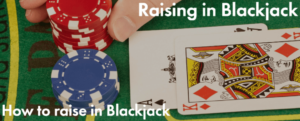Can you raise in blackjack?
This article is all about raising in blackjack. Blackjack is a hugely popular casino game. Much of this is down to the fact that it’s fast-paced and easy to learn. Players are attracted to the game because they know that they have the opportunity to influence the outcome and they really enjoy the challenge of playing with perfect strategy.
Something else that makes blackjack so loved is the fact that you get the chance to increase your initial bet after the game has already started. While people are familiar with the term ‘raise’ being used in poker, many don’t know that blackjack allows you to do the same. Let’s take a look at how.
Raising in Blackjack – How to raise in blackjack
Blackjack offers 2 options when it comes to raising. These are known as doubling down and splitting.
When it comes to doubling down, this is something that a blackjack player would only do if they’ve been dealt 2 good cards. By good, we mean that they have a hand that is strong and that they think is capable of beating the dealer. When they double down they get to double the size of their wager in return for being dealt just one more card.
Splitting is the action that players take when they’ve been dealt 2 cards that are the same. Splitting the cards creates 2 separate hands to play with. The original wager is still in place for the first hand and the player now has to make another bet, of the same value, to cover the second hand.
Each of the 2 hands are treated entirely separately. That means that a player may decide to stand with one while they hit with the other.
Both doubling down and splitting can bring some great opportunities for players. However, when they’re not quite sure what they’re doing, these can quickly wipe out your bankroll. That’s why there are strategies to be aware of when raising in blackjack and we’re going to take a look at these now.
Raising in Blackjack – When you should double down in blackjack
If you want to ramp up your playing profits, it’s important that you learn all about doubling down and the times that you should be doing this.
A hand totalling 11
If a player is holding their first 2 cards and has a hard total of 11, this presents the perfect opportunity to double down. That’s because this total means that they have a very good chance of getting blackjack with the next card. If the worst happens and they don’t reach 21, there is no way that they can go bust and there’s still a very good chance that the total will beat the dealer’s hand.
Soft hand totals – 16, 17 and 18
A soft hand is one where a player is holding an ace. The ace card can be used as either a 1 or an 11. You decide how to use it based on the total of your hand. Plenty of players aren’t sure how to play these hands but you now know that the right move is to double down. This is, even more, the case when the dealer’s upcard is of a low value. The reason you should double down is that you’re incredibly close to 21. At the same time, you have protection from going bust: if the next card dealt takes you over 21, you simply use the ace as a 1 and you’re safe.
Hard hands – 9 and 10
If you’re not holding an ace then you have a hard hand. The lack of an ace means that you have less flexibility but a total of 9 or 10 is still good for doubling down. You should check the dealer’s upcard and if it’s low then doubling down is definitely the way to go. That’s because all you need is a reasonably high card and you’ll be in a great position when it comes to beating the dealer.
The times when you should avoid doubling down
Doubling down can lead to some big wins in the right circumstances. However, more often than not it’s not the best decision to make. One stand-out scenario when you should never even dream of doubling down is when the dealer has an ace as their upcard. This ace gives them a great chance of getting blackjack.
If you have a hard hand that’s worth more than 11, you have a real risk of busting. That means doubling should be avoided here too.
Raising in Blackjack – When splitting is the right option in blackjack
These are some of the prime moments when you should at least consider splitting:
Two aces
If you’re holding 2 aces then you are in a great position. An ace means that you’re more likely to reach 21 so the best thing to do is split and play with 2 aces and give yourself the opportunity of getting 2 blackjacks.
Pair of 8s
If you have 2 8s, you’re holding 16 in total. This is a tough hand to play and the chances of winning are slim. The best thing to do here is split. By playing 2 separate hands, you then have a good chance of getting to 18 with both of them.
Pair of 10s
When it comes to 10s, it’s not always clear-cut. In many variants of this casino game, the advice is to split depending on the dealer’s cards. Card counting can help here as players know how many high-value cards there are in the pack.
Raising in Blackjack and Splitting – When should splitting be avoided?
If you have a pair of 9s, you shouldn’t split. Your hand of 18 is already strong and the chances of having 2 hands and each of them getting a 10 or an ace, are slim.
A pair of 5s shouldn’t be split. If you do split and end up with hands worth 15, the house edge automatically goes up. A pair of 4s shouldn’t be split either. That’s because it gives you a low starting point and you’re better off hitting and trying to reach 18.


